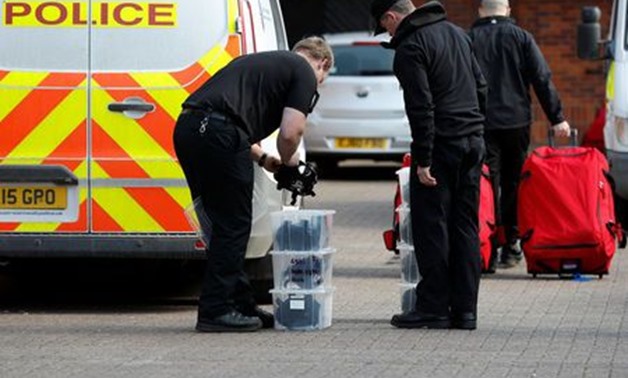
Inspectors from the Organisation for the Prohibition of Chemical Weapons arrive to begin work at the scene of the nerve agent attack on former Russian agent Sergei Skripal, in Salisbury - AFP
BRUSSELS - 23 March 2018: European Union leaders backed Britain on Thursday in blaming Moscow over a nerve agent attack on a former Russian spy in England and recalled their envoy to Moscow in a symbolic protest.
Diplomats said several countries were also considering their own retaliatory steps.
The show of support from the EU, at a time when Britain is grappling with its departure from the bloc, will boost Prime Minister Theresa May, who has also been asking other nations to match her decision to expel Russians over the attack.
In a joint summit statement, the leaders said the EU "agrees with the United Kingdom government's assessment that it is highly likely that the Russian Federation is responsible and that there is no plausible alternative explanation".
After discussions over dinner in Brussels, they added: "We stand in unqualified solidarity with the United Kingdom in the face of this grave challenge to our shared security."
May accused Russia of the first known offensive use of a nerve toxin in Europe since World War Two after Sergei Skripal, a former Russian double agent, and his daughter were found unconscious in the city of Salisbury on March 4.
The attack has sparked tit-for-tat retaliation. May's move to expel 23 "undeclared intelligence officials" was followed by similar measures from Moscow, including the closure of Britain's cultural centre in St Petersburg.
Over a dinner of lamb, May called on EU leaders to work together to confront the challenge Russia presented.
"Russia staged a brazen and reckless attack against the United Kingdom," May had said on arrival at the summit.
"It's clear that the Russian threat does not respect borders and indeed the incident in Salisbury was a pattern of Russian aggression against Europe and its near neighbours."
In the early days after the attack, May won the support of French President Emmanuel Macron, German Chancellor Angela Merkel and U.S. President Donald Trump when they said they shared Britain's assessment of Russian culpability.
But in Brussels, May had to convince more dovish states including Greece, Hungary and Bulgaria, that they should blame Russia squarely over the attack.
RUSSIAN SPIES
The summit agreement opens the way for EU leaders to discuss future "coordinated action". Lithuanian President Dalia Grybauskaite said she was ready to expel Russian spies and diplomats said Poland could do so too.
Both had held off to see who else would join.
Highlighting the bloc's familiar divisions on how to handle Russia, Slovakia's new prime minister, Peter Pellegrini, said he wanted "constructive dialogue" with Moscow despite the poisoning of the Skripals. British authorities say the pair have been critically ill since the attack by a Soviet-designed, military-grade nerve agent called Novichok.
"The European Union and its member states should also continue to bolster their capabilities to address hybrid threats, including in the areas of cyber, strategic communication and counter-intelligence," the leaders said.
May has also asked fellow European leaders to step up intelligence cooperation to start going after Russian spy networks, diplomats said.
"Britain says there are these networks that organise such things like Salisbury, that these networks exist across our borders and that it would be good to go after them together," a senior EU diplomat said.
Another diplomat said: "There is movement among several willing states to do something together in reaction to Skripal." The person added this could be done by some states individually, so as not to press more reluctant EU member states too hard.
"STRATEGIC ENEMY"
Russia has offered several different motives to explain the attack on the Skripals, who may have been left brain-damaged, and to absolve Moscow of responsibility. London has labelled that disinformation and distraction.
On Thursday, Moscow's ambassador to London, Vladimir Yakovenko, said that, had Novichok been used, the Skripals would have died and he rebuked British Foreign Secretary Boris Johnson for comparing Russia's hosting of the soccer World Cup this summer with Nazi Germany's hosting of the Olympics in 1936.
In Moscow, President Vladimir Putin discussed Britain's "unfriendly and provocative" policy at a session of the national security council, RIA news agency quoted the Kremlin as saying.
Ties between Russia and the West plummeted over Moscow's 2014 annexation of Crimea and support for rebels in eastern Ukraine. Both have triggered rounds of EU sanctions.
"Russia has shown itself as a strategic enemy, not a strategic partner," a British official said.


Comments
Leave a Comment